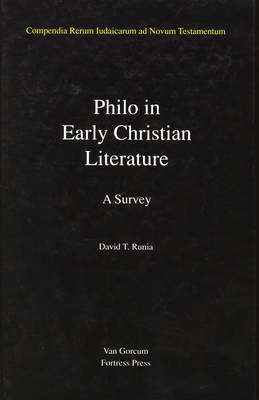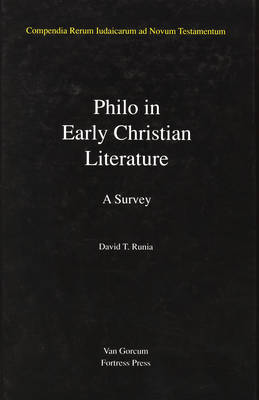
- Afhalen na 1 uur in een winkel met voorraad
- Gratis thuislevering in België vanaf € 30
- Ruim aanbod met 7 miljoen producten
- Afhalen na 1 uur in een winkel met voorraad
- Gratis thuislevering in België vanaf € 30
- Ruim aanbod met 7 miljoen producten
Zoeken
Jewish Traditions in Early Christian Literature, Volume 3 Philo in Early Christian Literature
A Survey
Runia
€ 117,95
+ 235 punten
Omschrijving
It is a remarkable fact that the writings of Philo, the Jew from Alexandria, were preserved because they were taken up in the Christian tradition. But the story of how this process of reception and appropriation took place has never been systematically research.
In this book the author first examines how Philo's works are related to the New Testament and the earliest Chritian writing, and then how they were used by Greek and Latin church fathers up to 400 c.e., with special attention to the contributions of Clement, Origen, Didymus, Eusebius, Gregory of Nyssa, Ambrose, and Augustine.
Philo in Early Christian Literature is a valuable guide to the state of scholarly research on a subject that has thus far been investigated in a rather piecemeal fashion.
In this book the author first examines how Philo's works are related to the New Testament and the earliest Chritian writing, and then how they were used by Greek and Latin church fathers up to 400 c.e., with special attention to the contributions of Clement, Origen, Didymus, Eusebius, Gregory of Nyssa, Ambrose, and Augustine.
Philo in Early Christian Literature is a valuable guide to the state of scholarly research on a subject that has thus far been investigated in a rather piecemeal fashion.
Specificaties
Betrokkenen
- Auteur(s):
- Uitgeverij:
Inhoud
- Aantal bladzijden:
- 438
- Taal:
- Engels
- Reeks:
- Reeksnummer:
- nr. 3
Eigenschappen
- Productcode (EAN):
- 9789023227137
- Verschijningsdatum:
- 1/01/1993
- Uitvoering:
- Hardcover
- Formaat:
- Genaaid
- Afmetingen:
- 157 mm x 241 mm
- Gewicht:
- 839 g

Alleen bij Standaard Boekhandel
+ 235 punten op je klantenkaart van Standaard Boekhandel
Beoordelingen
We publiceren alleen reviews die voldoen aan de voorwaarden voor reviews. Bekijk onze voorwaarden voor reviews.








